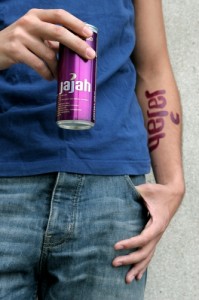Red Bull. Monster. Full Throttle. Hype. Wired. Spike Shooter. The brand names of popular energy drinks clearly suggest the youth market (12-35 years, according to industry figures) that has embraced them. But new warnings from Health Canada and the Canadian Medical Association may have parents confused about what specific dangers these caffeine and sugar-laden drinks pose for their kids.
What’s the story with energy drinks? Teens, athletes and young adults seek out these drinks to give them an energy boost for a variety of reasons: a big game, sleep deprivations, staying up all night to study or party. Celebrities have given them an important pop culture cachet and club-goers willingly pay highly inflated prices for the drinks.
On their own, energy drinks can be unhealthy for teens for a variety of reasons. The amounts of caffeine, while variable from brand to brand, are always higher than what you’d find in a conventional can of cola. A 12 oz. can of Coke or Pepsi has 34-38 mg of caffeine, while a cup of brewed coffee has between 80 and 100 mg of caffeine. A 12 oz. can of Red Bull has 116 mg. Other brands contain between 120 mg (Monster), 258 mg (Wired X344) and a staggering 428 mg (Spike Shooter).
Since the drinks are served cold, they are often consumed much more quickly than a hot cup of coffee, and the shooter formats are downed in a single gulp, forcing the body to process these stimulants very quickly (along with sugar, amino acids and herbal stimulants like taurine, guarana and gingko). Since teens are less likely to realize the potent effects of the drinks, they may drink or 4 or 5 in a short time.
Not too surprisingly, that can prove very dangerous. Energy drinks have been linked to seizures, heart palpitations, strokes and even sudden death. We also know that most of these drinks are consumed in the evening and are thus likely to affect sleep quality. Since many teens already deal with chronic sleep deprivation, this is a real concern.
If they are risky on their own, then energy drinks can prove even more deadly when combined with alcohol. Sometimes called “hair of the dog,” the cocktail combinations are intended to stave off the depressant effects of alcohol with the stimulating properties of the caffeine and sugar.
One clinical research study found that the combination can make users feel less drunk (and thus more likely to over-consume) but had the same impairment of motor coordination and visual reaction time. Another study of university students found that those who regularly mixed energy drinks and alcohol got drunk twice as often as those who just stuck to alcohol and were far more likely to be injured and require medical treatment while drinking.
Just as frightening, energy drink mixers more likely to be victims or perpetrators of aggressive sexual behaviours, even after researchers controlled for the amount of alcohol consumed. Another researcher found that energy drinks were highly linked to risk-taking among teens, what she called “toxic jock behavior.” Kathleen E. Miller, Ph.D. found that:
Frequent energy drink consumers (six or more days a month), according to Miller’s findings, were approximately three times as likely than less-frequent energy drink consumers or non-consumers to have smoked cigarettes, abused prescription drugs and been in a serious physical fight in the year prior to the survey. They reported drinking alcohol, having alcohol-related problems and using marijuana about twice as often as non-consumers. They were also more likely to engage in other forms of risk-taking, including unsafe sex, not using a seatbelt, participating in an extreme sport and doing something dangerous on a dare.
Health Canada’s recommendations are for teens to consume no more than 2.5 mg per kilogram of body weight. Older and heavier adolescents can follow adult recommendations, which are for no more than 400 mg of caffeine a day. It’s own expert panel has recommended that energy drinks be removed from grocery and convenience store shelves and sold under the supervision of pharmacists.
However the newest restrictions by Health Canada ignore their own best advice. Instead, energy drinks sold in Canada cannot have more than 180 mg of caffeine in a single serve container, equivalent to about 5 355 ml cans of Pepsi. It’s also more than double the recommended amount of caffeine for kids 10-12 years old. These regulations also exclude the highly concentrated “energy shots” sold at convenience stores and gas stations.
No one is happy about these watered-down health measures. Child safety and medical experts believe they don’t go far enough to protect teens.
In the meantime, parents need to understand the risks these drinks pose to their kids. Discuss your concerns with your kids, and explain the medical reasons for limiting their consumption. It’s also important to explain why it’s not safe to consume them with alcohol. It’s very possible your teens have no idea that the drinks, which look completely harmless on the shelves next to regular colas, could be so dangerous.



